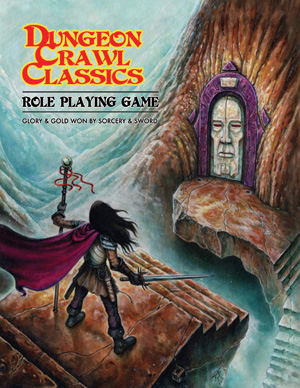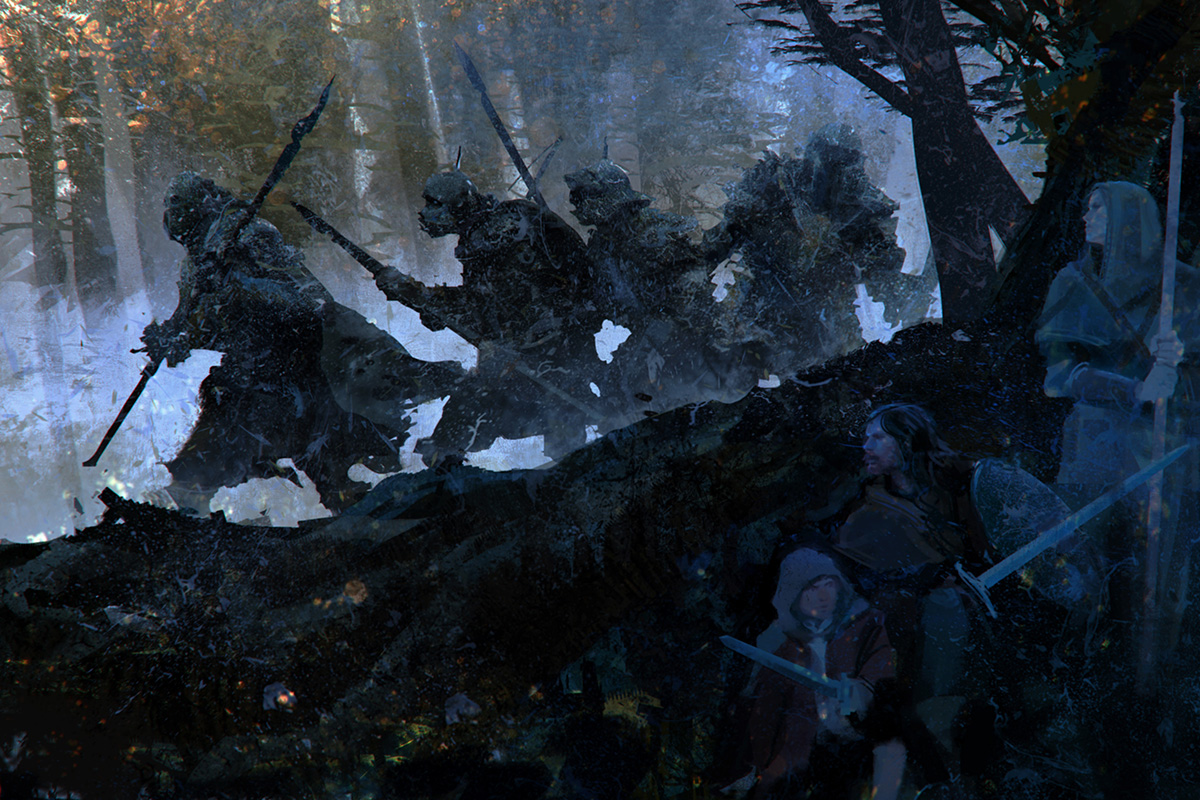 If the title looks like someone spilled alphabet soup on your computer screen, take heart: the OSR (Old School Renaissance or Old School Revival) isn’t something you’re likely to have heard about unless you stumbled across it on certain blogs, G+ communities, or conventions. At its heart, the OSR was a bunch of gamers who were dissatisfied with modern roleplaying games. “Modern” needs a bit of a disclaimer; the movement got its start during the reign of D&D 3.5. Since then, the OSR has gone through a number of stages, each building on the last to create a series of new roleplaying games that both reach back to the past as well as look towards an alternative future from mainstream RPGs.
If the title looks like someone spilled alphabet soup on your computer screen, take heart: the OSR (Old School Renaissance or Old School Revival) isn’t something you’re likely to have heard about unless you stumbled across it on certain blogs, G+ communities, or conventions. At its heart, the OSR was a bunch of gamers who were dissatisfied with modern roleplaying games. “Modern” needs a bit of a disclaimer; the movement got its start during the reign of D&D 3.5. Since then, the OSR has gone through a number of stages, each building on the last to create a series of new roleplaying games that both reach back to the past as well as look towards an alternative future from mainstream RPGs.
At first, OSR games sought to replicate the rules of older games, just to have them back in print. Chief among these are RPGs like Goblinoid Games’ Labyrinth Lord, a game which closely replicates the boxed-set BASIC and EXPERT D&D from the early ‘80s. While built on the chassis of D&D 3.5’s Open Gaming license, there’s very little of 3rd edition to find in Labyrinth Lord. Troll Lord Games’ Castles & Crusades, on the other hand, is a more open merging of D&D 3.5’s rules with the goals and modes of 1st edition AD&D.
In all OSR games of this era, simplicity and fidelity to the originals were key. There’s very little daylight between Labyrinth Lord and those thin booklets of early-‘80’s D&D, and you can write your character sheet on 3×5 index card. Since characters were fairly simple constructs, the goal of play was to challenge the player more than the character. Monster-slaying and story-telling took a back seat to exploration, and characters were developed by their actions and interactions more than their stats and class abilities. Gameplay was swift and promoted Game Master rulings over thick books of rules, so there wasn’t much time wasted flipping through manuals. The game the kids are playing in Stranger Things is very much of this style.
 While Labyrinth Lord and similar games hewed very closely to the styles and rules of their original inspirations, Castles & Crusades was already starting to experiment with the form. It leavens its old-schoolness with some of the better innovations of more modern games. The result is something that plays a lot like late-‘70s and early ‘80’s D&D, but has a few more bells and whistles that smooth out the original game’s rough edges. Other games took these ideas even further; the Adventurer Conqueror King System was designed from the ground up to flow smoothly through the classic three tiers of fantasy RPGing: the early game where PCs are just starting on the path to adventure; the middle game where the PCs are known heroes tackling challenges that threaten entire kingdoms; and the late game where the PCs rule kingdoms of their own and fight to save the entire world, if not the multiverse. Lamentations of the Flame Princess, on the other hand, seeks a more horror-inspired experience, where each monster is an individual being, hand-crafted by the Game Master and a total mystery to the players. Like characters in a Lovecraft story, PCs are most likely to encounter only one or two monsters during an adventure, and that encounter will be extremely memorable to everyone.
While Labyrinth Lord and similar games hewed very closely to the styles and rules of their original inspirations, Castles & Crusades was already starting to experiment with the form. It leavens its old-schoolness with some of the better innovations of more modern games. The result is something that plays a lot like late-‘70s and early ‘80’s D&D, but has a few more bells and whistles that smooth out the original game’s rough edges. Other games took these ideas even further; the Adventurer Conqueror King System was designed from the ground up to flow smoothly through the classic three tiers of fantasy RPGing: the early game where PCs are just starting on the path to adventure; the middle game where the PCs are known heroes tackling challenges that threaten entire kingdoms; and the late game where the PCs rule kingdoms of their own and fight to save the entire world, if not the multiverse. Lamentations of the Flame Princess, on the other hand, seeks a more horror-inspired experience, where each monster is an individual being, hand-crafted by the Game Master and a total mystery to the players. Like characters in a Lovecraft story, PCs are most likely to encounter only one or two monsters during an adventure, and that encounter will be extremely memorable to everyone.
 And then there are RPGs like Goodman Games’ Dungeon Crawl Classics. This is a game that tries to out old-school original D&D. It does this by amping up the danger and strangeness of D&D and clinging tightly to D&D’s sword & sorcery roots. For instance, instead of rolling up a 1st level fighter or thief, In DCC you roll up a handful of zero-level common folk. Those that survive long enough to earn advancement to 1st level get to pick an actual adventurer class. (As for the other characters you created, well, DCC doesn’t suggest you spend a lot of time naming them or giving them distinct personalities right off the bat.) Spell-slingers can fumble their spells, earning the ire of the gods for clerics or corruption and mutation for wizards. The game and the many adventures written for it revel in their “hard core” reputation.
And then there are RPGs like Goodman Games’ Dungeon Crawl Classics. This is a game that tries to out old-school original D&D. It does this by amping up the danger and strangeness of D&D and clinging tightly to D&D’s sword & sorcery roots. For instance, instead of rolling up a 1st level fighter or thief, In DCC you roll up a handful of zero-level common folk. Those that survive long enough to earn advancement to 1st level get to pick an actual adventurer class. (As for the other characters you created, well, DCC doesn’t suggest you spend a lot of time naming them or giving them distinct personalities right off the bat.) Spell-slingers can fumble their spells, earning the ire of the gods for clerics or corruption and mutation for wizards. The game and the many adventures written for it revel in their “hard core” reputation.
If you’re tired of shuffling six-page character sheets, spending more time flipping through rule books than you do exploring ancient ruins, or lugging around giant, thick-enough-to-stop-a-bullet rules tomes, an OSR game might be just what you need. Whether you’re looking to explore the roots of RPGs or just want an entire game that will fit easily in your backpack, the knowledgeable and friendly folks at your local Dragon’s Lair Comics and Fantasy® can point you in the right direction.



